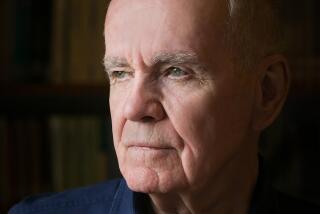FICTION
- Share via
THE CITY AND THE PILLAR AND SEVEN EARLY STORIES by Gore Vidal. (Random House: $23; 306 pp.) In 1948, aged 21, two years out of the army, Gore Vidal wrote “The City and the Pillar.” “If I published it,” he writes in this new preface to the novel and some stories, “I’d take a right turn and end up accursed in Thebes. Abandon it and I’d turn left and end up in holy Delphi. Honor required that I take the road to Thebes.” In this same preface Vidal acknowledges Thomas Mann’s (the novelist he “modeled himself on”) acknowledgment of his own work in Mann’s diaries. Is everybody happy? You bet.
Until “The City,” Vidal writes, “American novels of ‘inversion’ dealt with shrieking queens or lonely bookish boys who married unhappily and pined for Marines.” Vidal’s lonely, athletic but secretly dreamy and bookish hero falls early and hard in love with an athletic schoolmate who goes on to become a Marine and marries unhappily, denying everything that ever transpired between himself and his pining friend. These characters feel, well, young--in their expectations as well as their delusions, not especially fresh, and the agar, the social petri dishes they inhabit, are tedious as well. But back in 1948, it may well have been a battering ram of a book. The stories have much more power. In the middle of a modest flirtation in “Three Stratagems,” one of the players thinks to himself: “I realized that here before me was the beloved figure materialized, no longer a figure to haunt the night or an elusive expression remarked for a moment in a stranger’s face. . . .” The dialogue in these stories, so flat and phony, suffocates the seething inner lives of the characters, creating a marvelous tension, a physical feeling of evil and deception. In “The Zenner Trophy,” a star student is caught with another boy and the flimsy pillars on which rests the obliterating social milieu that Vidal writes about are exposed as the boy is expelled: “I can’t for the life of me,” says the boy, “see what business it is of anyone else what I do.” “Should this system,” explains his professor, “or any important part of it, be destroyed, the whole complex structure of civilization would collapse.”
More to Read
Sign up for our Book Club newsletter
Get the latest news, events and more from the Los Angeles Times Book Club, and help us get L.A. reading and talking.
You may occasionally receive promotional content from the Los Angeles Times.










